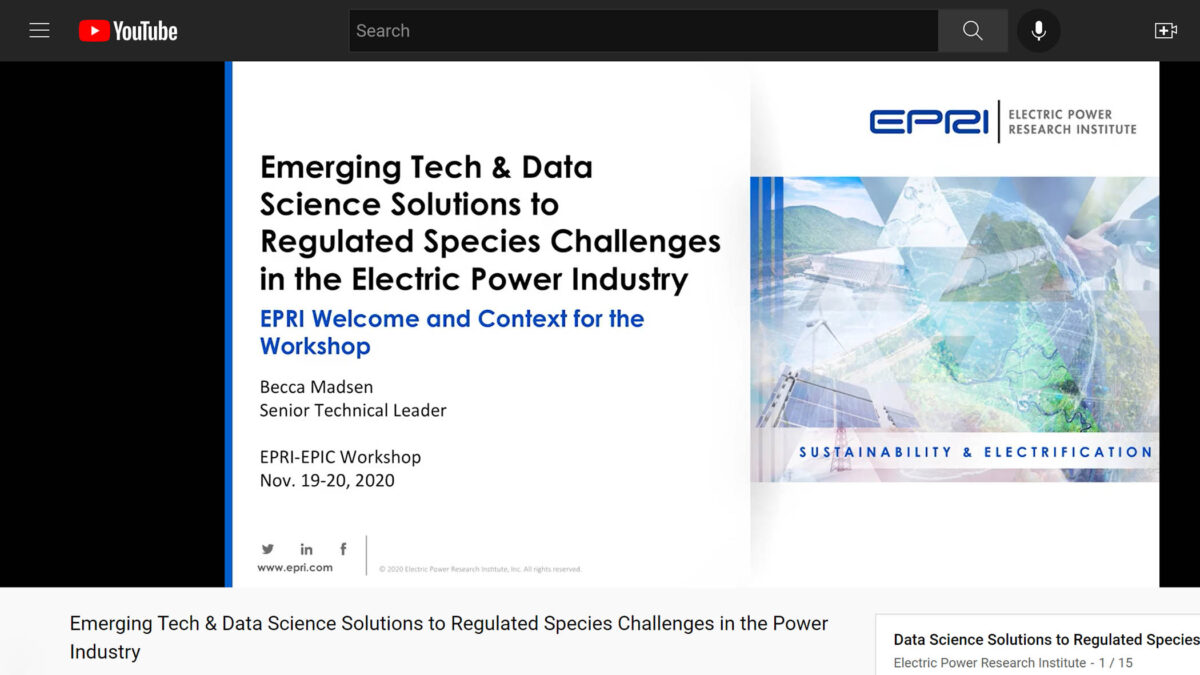Machine learning, drones, natural language processing, predictive modeling — data science as a field is nothing new to the energy industry nor to environmental management. But in 2019, two organizations began a conversation to bring all three disciplines together. The Electric Power Research Institute (EPRI) and the Environmental Policy Innovation Center (EPIC) sought to facilitate dialogue and idea-generation among professionals across this trio of industries. This EPRI-EPIC effort culminated in a fun and intense invitation-only workshop in Washington DC in late 2019, convening specialists and managers from federal laboratories, environmental consultancies, and electric utilities for two days of learning, networking, and inspiration. Afterwards, the event’s success soon led to plans for a follow-up gathering in 2020, diving deeper into specific environmental management issues, such as regulated species.
Then, the pandemic arrived.
The Story
Along with the personal devastation of the COVID-19 pandemic came the complete reimaging of work travel and professional convenings. As is now well-documented, conferences and other in-person events all had to adapt to new tools, ideas, and approaches in creating an engaging virtual meeting experience.
Working once again with the 2019 team of EPRI Senior Technical Lead Becca Madsen, EPIC Director of Markets Phoebe Higgins, and EPIC Data Science Fellow Kavita Kapur Macleod, I drew heavily on lessons learned by other event management case studies early on in the pandemic. Elements like informal networking and small-group discussions were highlights from our 2019 event that we wanted to carry over to this remotely hosted workshop. We also needed to optimize the in-person activities during the event itself, understanding the fatigue that can set in — as well as home priorities that pop up throughout a work-from-home day.
The Process
Considering the resources and ideas at hand, we settled on a series of features to implement in our 2020 workshop, which once again targeted a small, focused gathering of 40 to 50 guests.
- Asking panelists to pre-record their slide presentation and to limit their talk to around 10 minutes.
- Pre-loading recorded videos to a meeting portal, so attendees can view them on-demand ahead of the workshop.
- Structuring the workshop to focus panel time on the moderator and audience Q&A experience.
- Relying on breakout room feature of the conferencing software to replicate the small groups discussion experience.
- Building in longer breaks (minimum 20 minutes) between major schedule blocks.
- Creating optional social hours to open and close each day, for any attendees who craved extra interpersonal time.
- Keeping each day concisely structured within a single half-day block (in this case, afternoon Eastern Time), so attendees can better plan their home care and obligations around a single stretch of availability, rather than a longer day of more diffusely scheduled sessions.
- Instructing event leaders to double their wattage — project their enthusiasm and welcome even more when interacting with guests, so it carries across the virtual setting.
With that, we did our best to replicate the “fun formal” vibe of our 2019 outing. For my part as emcee, I once again took a page from the play-by-play sportscaster’s book, researching the biography and trivia of each speaker and attendee so that I would have a cache of conversation points to pull out when connecting guests or when introducing a speaker. I also wove in the ice-breaking element of the user experience within the tech platform introductions, familiarizing attendees with the chat function during each morning openings. (Free tip for my fellow event emcees: one of my favorite warmup questions is “What was the school mascot for your grad school, college, or high school?” Although this is a question unique to the U.S. cultural experience, it almost never fails to generate some fun energy and new mascot trivia, especially with the more obscure mentions!)
For my post-event survey, I again included the question “Did you have fun?” — and we were heartened to see that “Yes!” and “Absolutely!” also dotted the responses this year, with specific mentions of the social time, conversations, and facilitation. But we learned some lessons for improvement, too: for example, our attempt to host virtual expo tables for individual presenters were unevenly attended, possibly due to the issues with link navigation and perhaps scheduling overload. But overall — rallying guests across four time zones, representing expertise from organizations like American Electric Power, American Museum of Natural History, Argonne National Laboratory, Duke Energy, LimnoTech, NatureServe, Ramboll, Santee Cooper, and WEST — we produced an engaging, lively virtual event that seeded connections and sparked ideas. An experience worthy of the regulated species challenges that all our attendees had gathered in common interest.
My acknowledgements again to Becca, Phoebe, and Kavita for another wonderful collaboration, and to Kathy Melton at EPRI in particular for providing dedicated tech platform management throughout our event planning and run-of-show. And our thanks to longtime colleague and renowned scicomm pioneer Kirsten Sanford PhD of Broader Impacts Productions for providing us with video production assistance.
— Ben Young Landis
Lasting Impact
The suite of 15 pre-event presentations for this 2020 workshop are publicly available via this YouTube playlist, “Data Science Solutions to Regulated Species Challenges in the Electric Power Industry: An EPRI-EPIC Workshop (18-20 November 2020). From bats to eagles, from aerial drone monitoring to GIS database interoperability, dive into these informative discussions on tech solutions for conservation management.
2022 Update: Becca Madsen has now joined EPIC as their new Director of the Restoration Economy Center! You can find Becca’s new bio in this EPIC team roster.
Credits
Clients: Electric Power Research Institute (EPRI) / Environmental Policy Innovation Center (EPIC)
Websites: www.epri.com / www.policyinnovation.org / 2020 Workshop Agenda / Workshop Presentations
Delivered: July-November 2020
Creative Direction: Becca Madsen (EPRI), Phoebe Higgins (EPIC), Kavita Kapur Macleod (EPIC), Ben Young Landis
Program Management: Becca Madsen (EPRI), Phoebe Higgins (EPIC), Kavita Kapur Macleod (EPIC)
Additional Copywriting and Design: Ben Young Landis
Lead Facilitator and Emcee: Ben Young Landis
Video Content Producer: Kirsten Sanford / Broader Impacts Productions
EPRI Event Staff: Kathy Melton, Wendy Palmer

